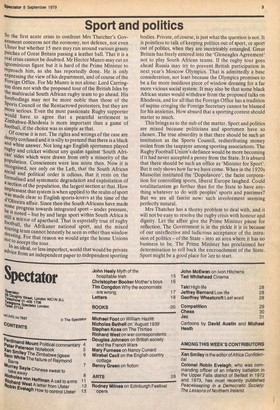Sport and politics
So the first acute crisis to confront Mrs Thatcher's Government concerns not the economy, not defence, not even Ulster but whether 15 men may run around various grassy Patches of Great Britain passing a leather ball. That it is a real crisis cannot be doubted. Mr Hector Munro may cut an ignominious figure but it is hard of the Prime Minister to reproach him, as she has reportedly done. He is only expressing the view of his department, and of course of the Foreign Office. For Mr Munro is not alone: Lord Carrington does not wish the proposed tour of the British Isles by the multiracial South African rugby team to go ahead. His forebodings may not be more noble than those of the Sports Council or the Rentacrowd protestors, but they are more serious. Even the most passionate Rugby supporter would have to agree that a peaceful settlement in Zimbabwe-Rhodesia is more important than a game of football, if the choice was as simple as that. Of course it is not. The rights and wrongs of the case are deeply confused and it is silly to pretend that there is a black and white answer. Not long ago English sportsmen played rugby and cricket without any qualm against 'South African' sides which were drawn from only a minority of the Population. Consciences were less acute then. Now it is recognised, not only on the Left, that the South African !ocial and political order is odious, that it rests on, the tormalised and systematic degradation and exploitation of a section of the population, the largest section at that. How unpleasant that system is when applied to the realm of sport was made clear to English sports-lovers at the time of the _crOliveira affair. Since then the South Africans have made Ilzurle progress towards integrated sport — under pressure, it noted — but by and large sport within South Africa is a mirror of apartheid. That is especially true Of rugby trball, the Afrikaner national sport, and the mixed ?uring team cannot honestly be seen as other than window tairessing. For that reason we would urge the home Unions ut to accept the tour.
_ an ideal, or less imperfect, world that would be private navice from an independent paper to independent sporting bodies. Private, of course, is just what the question is not. It is pointless to talk of keeping politics out of sport, or sport out of politics, when they are inextricably entangled. Great Britain has freely entered into the 'Gleneagles Agreement' not to play South African teams. If the rugby tour goes ahead Russia may try to prevent British participation in next year's Moscow Olympics. That is admittedly a base consideration, not least because the Olympics promises to be a far more insidious piece of window dressing for a far more vicious social system. It may also be that some black African states would withdraw from the proposed talks on Rhodesia, and for all that the Foreign Office has a tradition of supine cringing the Foreign Secretary cannot be blamed for his anxieties. How absurd that a sporting contest should matter so much.
This brings us to the nub of the matter. Sport and politics are mixed because politicians and sportsmen have so chosen. The true absurdity is that there should be such an institution as the Sports Council, redistributing money stolen from the taxpayer among sporting associations. The Rugby Football Union's defiance would be more becoming if it had never accepted a penny from the State. It is absurd that there should be such an office as 'Minister for Sport'. But it only shows how far we have come. When in the 1920s Mussolini instituted the `Dopolavoro', the facist corporation for controlling sports, liberal Europe laughed. Could totalitarianism go further than for the State to have anything whatever to do with peoples' sports and pastimes? But we are all fascist now: such involvement seeming perfectly natural.
Mrs Thatcher has a thorny problem to deal with, and it will not be easy to resolve the rugby crisis with honour and dignity. Let the affair give the Prime Minister pause for reflection. The Government is in the pickle it is in because of our unreflective and ludicrous acceptance of the intrusion of politics — of the State — into an area where it has no business to be. The Prime Minister has proclaimed her determination to roll back the encroachment of the State. Sport might be a good place for her to start.


































 Previous page
Previous page